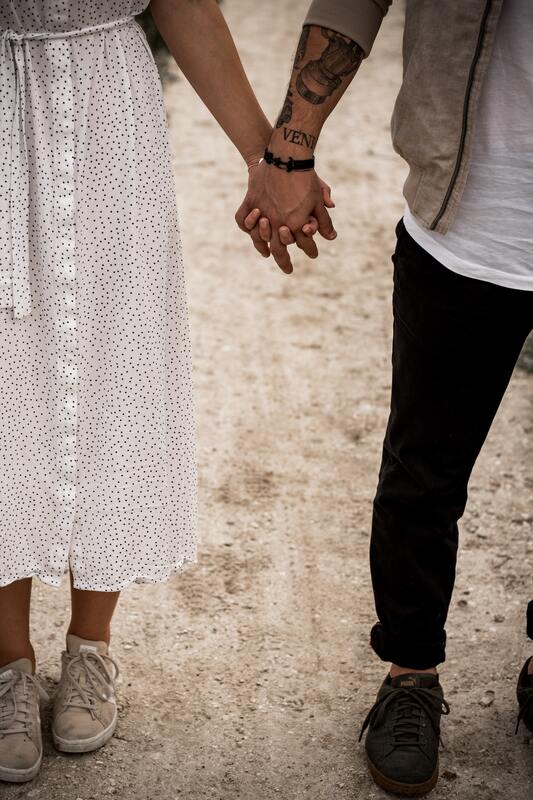
The Magic of Boundaries
I had no idea what boundaries were until graduate school. I’d never even heard the word—which is mind-blowing today. You can’t get on Instagram without seeing like ten different posts about boundaries. So, most people have at least heard the word “boundary,” but many still don’t really understand what boundaries are.
But for the rest of us—which is most of us—a clear understanding of boundaries can literally change our lives.
Wait—I can say “no” to that?
… I can disagree with someone close to me, and I don’t have to end the relationship over it?
… I can just ask for what I want/need?
… I don’t have to guess what everyone else expects of me, I can just ask?
… I can clearly state what I like and what I don’t like?
Yes. Yes, you can.
With the magic of boundaries it’s possible to be fully true to and in touch with your authentic self AND remain in relationship with others. Even people who are radically different from you! It’s a beautiful and freeing thing.
So, What Are Boundaries Anyway?
Boundaries are the guidelines and expectations we identify for ourselves about how we’d like to be treated by others and what actions we’ll take if someone oversteps those limits.
Boundaries are just as much about relationships as they are about self-protection. In fact, relationships aren’t really possible without boundaries.
Relationships Happen in the Space Between
Without boundaries we have no I/thou relationship. We have no you and we have no me. Boundaries are the foundation upon which all relationships lie, whether we’re conscious of it or not. And the healthier our boundaries are, the healthier our relationships will be.
Boundaries help us define where we end and where other people begin. Boundaries clarify what is ours and what is other people's; what is ours to hold, what is our responsibility, and what is not.
A common issue in relationships that lack healthy boundaries is that we take on other people’s “stuff.” Relationships that lack boundaries feel unsafe because we don’t know what's expected of us, and others don’t know what's expected of them. There’s no such thing as a relationship without expectations—we all have expectations about how we want to be treated. So, we all have boundaries, many of us just aren’t aware of them.
Usually when we struggle to understand boundaries, we also aren't clear on constitutes healthy vs. unhealthy relationships. So, let’s look at that.
What Do Healthy Relationships Feel Like?
 Photo by Nadine Rupprecht on Unsplash | In healthy relationships, where the people involved have healthy boundaries, everyone feels free to be themselves. In healthy, functional relationships we are able to have our own experience, think our own thoughts, and feel our own feelings. In healthy relationships there is room for disagreement and differences between people, and there is a mutual curiosity and respect for all people’s opinions, thoughts, feelings, experiences, perceptions, values, and beliefs. There is a sense of internal and external safety in healthy relationships. Our body is able to relax, and we're able to be spontaneous in our self-expression because we know we're safe. All of this is made possible by boundaries. |
In relationships with healthy boundaries, individuality and differences are expected and valued, and conflict is navigated openly and with respect for all involved.
What About Relationships with Unhealthy Boundaries?
In dysfunctional, unhealthy, or toxic relationships the people involved do not feel free to be themselves. Often, when all we’ve ever known is dysfunctional relationships and the inherent restriction that comes along with them (if we grew up in a dysfunctional family, for instance) we don’t even realize the extent to which we have learned to self-censor.
In dysfunctional relationships there is little tolerance for disagreement, conflict, or differences in experience or opinion. In dysfunctional relationships there are unsaid rules about what is OK to do (discuss, feel, think, etc.) and what is not OK. If someone breaks these rules, they’re then punished in either overt or covert (passive aggressive) ways.
In dysfunctional relationships people are expected to guess or intuit other people's wants and needs. In dysfunctional relationships people try to get their needs met through coercion and manipulation, because they cannot ask overtly for what they want and need. All of these dysfunctional dynamics are results of unhealthy, or unclear and unenforced, boundaries.
What Happens if Someone Doesn’t Respect My Boundaries?
Not everyone will respect our boundaries, and we have no control over other people’s actions. We only have control over ourselves and how we choose to respond when our boundaries aren’t respected.
If someone refuses to respect our boundaries we then have to decide what we need to do to protect ourselves. Some boundaries are more flexible than others. But an important part of setting and maintaining healthy boundaries is following through and enforcing them when they’re crossed.
Some questions that may be helpful to ask yourself when trying to decide how to respond to a boundary violation are: How often does this happen? Did the person know about this boundary? Was this intentional or an honest mistake? How did the person respond when I told them?
Boundaries in Abusive Relationships
| What if you're in a relationship with someone who consistently refuses to respect your boundaries? If someone is consistently disrespecting your boundaries, then they are consistently disrespecting you. In healthy, safe relationships you will feel comfortable saying "no" and being open about what you want and need. In healthy, safe relationships you will not be talked out of your feelings. In healthy, safe relationships, it's OK to agree to disagree and leave it at that. If someone continual argues with you about your boundaries and attempts to convince you to back-down, this is red flag. |  Photo by Filipp Romanovski on Unsplash |
Types of Boundaries
- Physical boundaries. This is anything that involves your physical body. How, if, when, where you want to be touched.
- Sexual boundaries are a sub-type of physical boundaries that center specifically around sexual intimacy. What feels good and safe to you, and what does not?
- Emotional boundaries. You get to have your feelings. Other people get to have their feelings. We don't have to feel the same way about everything (or anything). We aren't responsible for other people’s emotions, other people aren't responsible for ours. However, humans are social animals and we do impact each other, so having compassion and acknowledging when our actions have created hurt feelings in another person is also a part of skillful relating.
- Mental boundaries. Your thoughts, opinions, beliefs and values are your own. You are entitled to think the way you do, and so are others.
- Spiritual boundaries. You are entitled to believe what you wish and practice your spirituality or religion how you want.
- Financial/Material boundaries. Your right to decide what you do with your money and possessions, and how/if you offer your services and labor.
- Time boundaries. You get to decide how and with whom you spend your time. Time is valuable and time is a resource.
How healthy are your boundaries? How comfortable do you feel saying “no”?
Looking for an online therapist in Kansas?
Ready to work on your boundaries? My Lawrence, Kansas counseling practice specializes in providing therapy for childhood trauma, therapy for anxiety, therapy for self-esteem, therapy for Highly Sensitive People, and grief and bereavement counseling. I help people overcome shame and the fear of being their true selves. Breaking the cycles of people pleasing and self-abandonment is possible, and I'm here to help.
I offer online counseling throughout Kansas. Reach out today to schedule your free 15 minute phone consultation. I'd love to hear from you!
Other Services Offered by Maggie
In addition to providing online therapy anywhere in Kansas, I’m also a professional astrologer, and offer Birth Chart Readings anywhere in the United States, as well as abroad.
Astrology is a powerful tool for gaining self-awareness, finding meaning in and understanding of our difficult experiences, and for receiving validation regarding our own unique life path. All of which supports our mental health in a positive way!
Interested in getting a Natal Chart Reading? Book a free phone consultation and let’s get started!

 RSS Feed
RSS Feed
